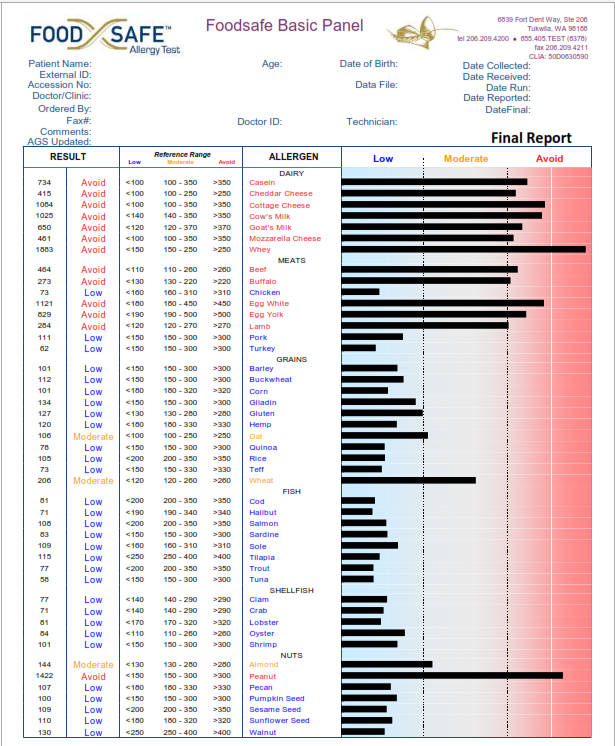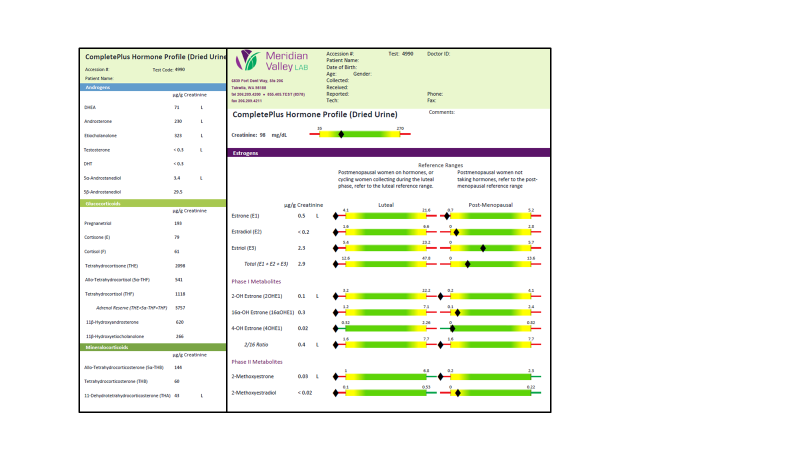Support Growth Hormone Naturally
Growth hormone (somatotropin) has an important role in many physiological processes, such as bone and organ growth, calcium balance, fat metabolism and the maintenance of lean body mass. Lower levels of growth hormone are associated with increasing age.1
Growth hormone is secreted by the pituitary gland; levels are highest in children and adolescents and decline with age.2 Pituitary hormones, including growth hormone, may be further reduced by the presence of other diseases, medication use, immune status, nutritional status, abdominal fat, glucose-insulin status, sex hormone status and exercise.1 Without testing, it may be easy to attribute the effects of low pituitary function as natural frailty in elderly individuals. Growth hormone may be measured in serum or urine, and studies have correlated serum concentrations with urinary growth hormone levels in adults.3 While multiple tests and imaging studies are required for a complete diagnosis of pituitary deficiency (hypopituitarism), the use of urinary growth hormone as a screening test for acquired or sub-clinical insufficiency may provide additional clinical insights.4 Of note, the presence of liver disease increases growth hormone levels inappropriately.5
In adults, pituitary function may be affected by a variety of causes:
- Injury4
- Traumatic brain injury
- Tumors
- Meningitis
- Tuberculosis
- Severe blood loss
- Environmental exposures6
- Pesticides (nonylphenols)
- Toxic metals (arsenic, lead)
- Polychlorinated dibenzodioxins (2,3,7,8-Tetrachlorodibenzo-p-dioxin (TCDD or Agent Orange)
- Polychlorinated biphenyls (PCBs)
- Medical4
- Brain surgery
- Chemotherapy
- Radiation therapy of the brain
- Concurrent disease
- Insulin-glucose dysregulation (type II diabetes or metabolic disorder1
- Immune dysregulation
- IgG4-related autoimmune disease (hypophysitis)7,8
- May simultaneously affect pancreas, pituitary and other organs
- May have high serum IgG4 levels > 135 mg/dL
- Neuroinflammation9
- IgG4-related autoimmune disease (hypophysitis)7,8
- Low sex hormone levels10,11
The synthesis and release of growth hormone is regulated by the hypothalamus in the central nervous system.10 The hypothalamus secretes growth-hormone-releasing hormone (GHRH) and the growth hormone-inhibiting factor somatostatin. There are also multiple negative feedback mechanisms that depend on the levels of insulin-like-growth factor-1 (IGF-1), somatostatin, and growth hormone itself. Hypothalamus function may be altered by neurotransmitter levels, inflammation, stress, and sex hormone levels.12,13 The hypothalamus may respond to mind-body, hormone replacement and anti-inflammatory therapies.14,15 Most growth hormone effects in the body are mediated through IGF-1. Because many different regulatory hormones are secreted by the pituitary gland, symptoms of pituitary insufficiency may include:4,7,16
- Gastrointestinal symptoms
- Abdominal pain, poor appetite, nausea/vomiting, constipation
- Diabetes
- Excessive thirst and urination
- Dry skin
- Weakness
- Anemia or changes is white blood cell counts (histiocytosis)
- Headaches or dizziness
- Cold sensitivity
- Weight changes
- Hormone dysfunctions (infertility, menstrual changes, decreased libido)
- Rapid aging
- Intra-abdominal (belly) fat
While growth hormone may be given by injection in cases of true deficiency, there is some concern that excess growth hormone may be just as harmful as an insufficiency; the adverse effects of supplementation may include insulin dysregulation, joint pain, carpal tunnel syndrome, fluid retention and gynecomastia (men).17 Growth hormone replacement is also contraindicated if there is a history of cancer.16 For most individuals, it may be prudent to use nutrition and lifestyle changes to boost growth hormone levels naturally.10 Interventions to improve growth hormone levels may include:
- Food allergy avoidance
- Symptoms of IgG4-related disease may respond to an elimination diet determined specifically by blood-spot or serum IgG4 food-sensitivity testing.18

- Hormone replacement therapy10,19
- Transdermal bio-identical hormone replacement may be used in adults after andropause or menopause. Dried urine or 24-hour urine hormone testing may be used to screen for low hormone levels and used to monitor replacement therapies.

- Exercise20
- High-intensity exercise increases growth hormone secretion, however as age increases there may be lower levels of pituitary response. Studies in young and older adults indicate that exercise to lactic acid threshold stimulates the best growth hormone response. An average person reaches their lactic acid threshold at about 60% of their VO2 max (highest oxygen consumption during increasing exercise intensity).21
- Sleep hygiene22,23
- The incidence of insomnia, sleep apnea and other sleep disorders increases in older populations. Adopting several positive habits to promote healthy sleep may increase growth hormone levels
- Avoid stimulants
- Keep sleep areas quiet, dark and cool
- Relax for at least an hour before bedtime
- Avoid blue light (phones, screens) at night, and get natural light exposure during the day.
- Be consistent with sleep/wake times
- Have last meal several hours prior to bedtime
- Avoid late-day napping
- Exercise early or at least three hours prior to bedtime
- The incidence of insomnia, sleep apnea and other sleep disorders increases in older populations. Adopting several positive habits to promote healthy sleep may increase growth hormone levels
- Normalize body mass index (BMI) using diet and exercise24,25
- Human studies indicate that obese individuals may have a blunted response to available growth hormone, and higher levels of growth hormone binding proteins that prevent the hormone from activating it’s receptor. A hypocaloric diet combined with resistance (or resistance and endurance) has been shown in studies to be most effective in reducing BMI, promoting changes in body composition and improving insulin resistance.
- Modify diet
- Human studies indicate that dietary fiber and vitamin C intake > 75 mg daily are positively associated with higher growth hormone levels.26
- Higher protein intakes temporarily increase growth hormone levels.27
- Experimental fasting from 1-5 day’s duration has been shown to increase growth hormone in human volunteers.28,29 Fasting should only be attempted under the supervision of a health-care provider.
- Supplements
- Amino acids
- An oral amino acid blend containing L-lysine HCl, L-arginine HCL, oxo-proline, N-acetyl-L-cysteine, L-glutamine, and Schizonepeta tenuifolia (aerial parts) powder significantly increased growth hormone secretion in human volunteers.30
- An oral 2,000 mg dose of glutamine has also been shown to increase growth hormone levels in humans.31
- Acetylcholine precursor glycerophosphocholine 1,000 mg significantly increased growth hormone levels in young adult males.32
- Amino acids
- Stress Management
- Twelve weeks of yoga practice (static postures, flowing postures, breathwork, meditation) significantly increased growth hormone and dehydroepiandrosterone sulfate (DHEA-S) levels compared to a control group.33
Throughout life, growth hormone is an important modulator of body composition, general metabolism and aerobic capacity. Evaluating, and then maintaining, growth hormone levels may improve quality of life and decrease chronic health risks in older adults.
References:
1. Veldhuis J. Changes in Pituitary Function with Aging and Implications for Patient Care. Nat Rev Endocrinol. 2013 Apr; 9(4): 205–215.
2. Siebert D, Ashwin R. The Use and Abuse of Human Growth Hormone in Sports. Sports Health. 2018 Sep-Oct; 10(5): 419–426.
3. Gill M, Toogood A, O’Neill P, Thorner M, Shalet S, Clayton P. Urinary Growth Hormone (GH), Insulin-Like Growth Factor I (IGF-I), and IGF-Binding Protein-3 Measurements in the Diagnosis of Adult GH Deficiency. J Clin Endocrinol Metab. 1998 Jul; 83(7): 2562–2565.
4. Endocrine Society (2019) Hypopituitarism. https://www.hormone.org/diseases-and-conditions/hypopituitarism Accessed 24 October 2019.
5. Møller S, Grønb˦k M, Main K, Becker U, Skakkeb˦k N. Urinary growth hormone (U-GH) excretion and serum insulin-like growth factor 1 (IGF-1) in patients with alcoholic cirrhosis. J Hepatology 1993; 17(3): 315-320.
6. Rattan S, Zhou C, Chiang C, Mahalingam S, Brehm E, Flaws JA. Exposure to endocrine disruptors during adulthood: consequences for female fertility. J Endocrinol. 2017; 233(3): R109–R129.
7. Joshi H, Hikmat M, Devadass AP, Oyibo SO, Sagi SV. Anterior hypopituitarism secondary to biopsy-proven IgG4-related hypophysitis in a young man. Endocrinol Diabetes Metab Case Rep. 2019; 2019: 18-0137.
8. Wolfson AR, Hamilos DL. Recent advances in understanding and managing IgG4-related disease. F1000Res. 2017; 6: F1000 Faculty Rev-185.
9. DiSabato DJ, Quan N, Godbout JP. Neuroinflammation: the devil is in the details. J Neurochem. 2016; 139 Suppl 2(Suppl 2):136–153.
10. Fanciulli G, Delitala A, Delitala G. Growth hormone, menopause and ageing: no definite evidence for ‘rejuvenation’ with growth hormone. Hum Reprod Update. May-June 2009; 15(3): 341–358.
11. Schurgin S, Dolan S, Perlstein A, Sullivan MP, Aliabadi N, Grinspoon S. Effects of testosterone administration on growth hormone pulse dynamics in human immunodeficiency virus-infected women. J Clin Endocrinol Metab. 2004 Jul; 89(7): 3290-7.
12. Cai D, Liu T. Hypothalamic inflammation: a double-edged sword to nutritional diseases. Ann NY Acad Sci. 2011; 1243: E1–E39.
13. Liu YZ, Wang YX, Jiang CL. Inflammation: The Common Pathway of Stress-Related Diseases. Front Hum Neurosci. 2017; 11: 316.
14. Buric I, Farias M, Jong J, Mee C, Brazil IA. What Is the Molecular Signature of Mind-Body Interventions? A Systematic Review of Gene Expression Changes Induced by Meditation and Related Practices. Front Immunol. 2017 Jun 16; 8: 670.
15. Ali SA, Begum T, Reza F. Hormonal Influences on Cognitive Function. Malays J Med Sci. 2018; 25(4): 31–41.
16. Kahn A, Sane D, Wannenburg T, Sonntag W. Growth hormone, insulin-like growth factor-1 and the aging cardiovascular system. Cardiovasc Res. 2002 Apr; 54(1): 25–35.
17. Samaras N, Papadopoulou MA, Samaras D, Ongaro F. Off-label use of hormones as an antiaging strategy: a review. Clin Interv Aging. 2014; 9: 1175–1186.
18. Clayton F, Fang J, Gleich G, Lucendo A, Olala J, Vinson L, Lowchik A, Chen X, et al. Eosinophilic Esophagitis in Adults Is Associated With IgG4 and Not Mediated by IgE. Gastroenterology 2014 Sept; 147(3): 602-609.
19. Roelfsema F, Yang RJ, Takahashi PY, Erickson D, Bowers CY, Veldhuis JD. Aromatized Estrogens Amplify Nocturnal Growth Hormone Secretion in Testosterone-Replaced Older Hypogonadal Men. J Clin Endocrinol Metab. 2018 Dec 1;103(12):4419-4427.
20. Wideman L, Weltman JY, Hartman ML, Veldhuis JD, Weltman A. Growth hormone release during acute and chronic aerobic and resistance exercise: recent findings. Sports Med. 2002;32(15):987-1004.
21. Vitiello MV, Schwartz RS, Moe KE, Mazzoni G, Merriam GR. Treating age-related changes in somatotrophic hormones, sleep, and cognition. Dialogues Clin Neurosci. 2001; 3(3): 229–236.
22. Pennington C. The Exercise Effect on the Anaerobic Threshold in Response to Graded Exercise. Intl J Health Sci. 2015 Mar; 3(1). DOI: 10.15640/ijhs.v3n1a14. Accessed 12 November 2019.
23. Division of Sleep Medicine, Harvard Medical School (2007) Twelve Simple Tips to Improve Your Sleep. http://healthysleep.med.harvard.edu/healthy/getting/overcoming/tips Accessed 28 October 2019.
24. Thomas G, Kraemer W, Kenett M, Comstock B, Maresh C, Denegar C, Volek J, Hymer W. Immunoreactive and bioactive growth hormone responses to resistance exercise in men who are lean or obese. J Appl Physiol. 2011 Aug; 111(2): 465-472.
25. Clark JE. Diet, exercise or diet with exercise: comparing the effectiveness of treatment options for weight-loss and changes in fitness for adults (18–65 years old) who are overfat, or obese; systematic review and meta-analysis. J Diabetes Metab Disord. 2015; 14: 31.
26. Denny-Brown S, Stanley TL, Grinspoon SK, Makimura H. The association of macro- and micronutrient intake with growth hormone secretion. Growth Horm IGF Res. 2012;22(3-4):102–107.
27. van Vught AJ, Nieuwenhuizen AG, Veldhorst MA, Brummer RJ, Westerterp-Plantenga MS. The effects of protein ingestion on GH concentrations in visceral obesity. Horm Metab Res. 2010 Sep; 42(10): 740-5.
28. Salgin B, Marcovecchio ML, Hill N, Dunger DB, Frystyk J. The effect of prolonged fasting on levels of growth hormone-binding protein and free growth hormone. Growth Horm IGF Res. 2012 Apr;22(2):76-81.
29. Ho KY, Veldhuis JD, Johnson ML, et al. Fasting enhances growth hormone secretion and amplifies the complex rhythms of growth hormone secretion in man. J Clin Invest. 1988; 81(4): 968–975.
30. Tam CS, Johnson WD, Rood J, Heaton AL, Greenway FL. Increased Human Growth Hormone After Oral Consumption of an Amino Acid Supplement: Results of a Randomized, Placebo-Controlled, Double-Blind, Crossover Study in Healthy Subjects. Am J Ther. 2019 Mar 8. doi: 10.1097/MJT.0000000000000893.
31. Welbourne TC. Increased plasma bicarbonate and growth hormone after an oral glutamine load. Am J Clin Nutr. 1995 May; 61(5): 1058-61.
32. Kawamura T, Okubo T, Sato K, Fujita S, Goto K, Hamaoka T, Iemitsu M. Glycerophosphocholine enhances growth hormone secretion and fat oxidation in young adults. Nutrition. 2012 Nov-Dec; 28(11-12): 1122-6.
33. Chatterjee S, Mondal S. Effect of regular yogic training on growth hormone and dehydroepiandrosterone sulfate as an endocrine marker of aging. Evid Based Complement Alternat Med. 2014; 2014: 240581.
